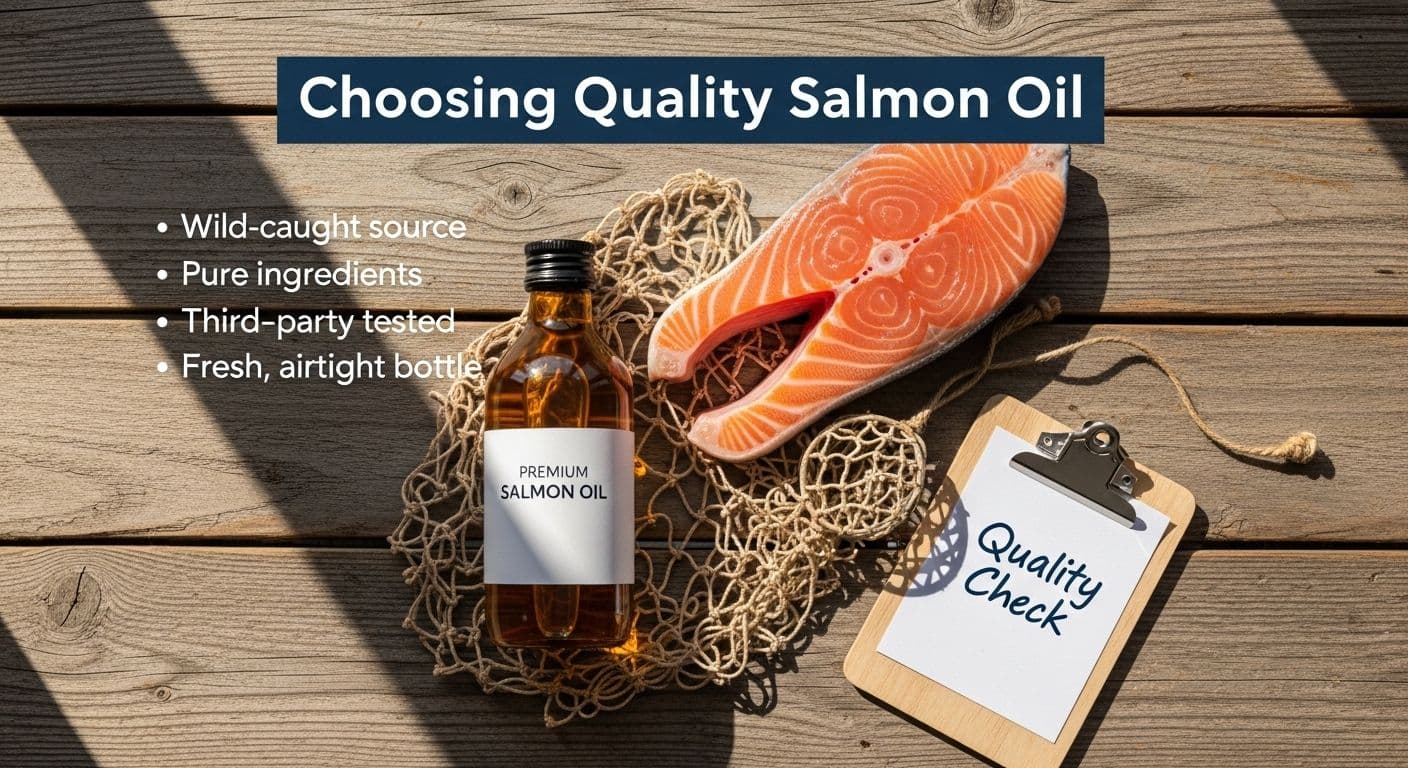Is salmon oil good for dogs, and can it really help your four-legged companion feel their best? If you’ve been wondering about adding salmon oil for dogs, you’re in good company. With so many pet parents looking for ways to improve their dog’s health, it’s no surprise there’s so much buzz around salmon oil. In this friendly, step-by-step how-to guide, I’ll show you exactly why salmon oil good for dogs is more than just a trendy pet supplement.
Why Dogs Need Omega-3s

Let’s kick things off with the basics. Dogs can’t create certain fatty acids—like the omega-3s known as EPA and DHA, on their own. That means these fats must come from what they eat. Most dog foods are higher in omega-6s (from grains, vegetable oils, etc.), but they usually don’t have enough omega-3 fatty acids. That’s where salmon oil for dogs steps into the spotlight.
Omega-3s help:
- Keep skin healthy and coats shiny
- Support normal inflammation response (bye-bye itchy skin)
- Boost brain health for pups and seniors alike
- Benefit joints and mobility
- Strengthen the immune system and heart
Salmon Oil Good for Dogs: How It Works
So, how does this stuff actually help? Adding salmon oil for dogs supplies a highly digestible form of omega-3s that their bodies cleverly recognize and use right away. Wild Alaskan salmon oil for dogs, in particular, is often praised for its purity, taste, and impressive EPA and DHA levels. Because salmon oil is derived from fish, it’s significantly more potent than any plant-based source of omega-3.
While you might also hear about fish oil for cats, cod liver oil for dogs, or krill oil for dogs, salmon oil stands out for its ideal balance of omega-3s and lower risk of contaminants when it’s ethically sourced.
If you’re on the hunt for the best omega 3 fatty acids for dogs, you’ll rarely go wrong with a top-quality salmon oil, especially from wild-caught sources.
What is Salmon Oil for Dogs?
Key Benefits of Salmon Oil for Dogs
It’s not just hype—there’s solid research behind the benefits of salmon oil for dogs. Let’s get into the main highlights.
Promotes Healthier Skin and Coat
Struggling with a dog that’s itchy, flaky, or shedding nonstop? Dog skin health benefits their skin in a big way:
- Helps lock in moisture, easing dryness and itchiness
- Reduces shedding and improves coat luster
- Can soothe “hot spots” or allergy flare-ups
- Offers relief for dogs handling seasonal itching or environmental allergens
Supports Joints and Mobility
Whether you have a senior dog or a super active pup, joint issues can crop up. Here’s where salmon oil shines:
- Helps calm inflammation tied to dog arthritis inflammation or stiffness
- Keeps dogs moving freely—hikes and stair-climbing become easier
- Contributes to healthy cartilage and may reduce discomfort in dogs with osteoarthritis
Brain and Eye Development
Puppies and older dogs alike can reap mental perks from omega-3s:
- Boosts canine brain development, learning, and memory in growing pups
- Helps sharpen focus and overall cognition in senior dogs
- Encourages healthy vision and normal eye development
Bolsters Immune and Heart Health
A robust immune system and a hearty heart are vital:
- Supports your dog immune system against illnesses
- May help regulate cholesterol and triglycerides
- Promotes healthy blood pressure and dog heart health
May Support Dogs With Chronic Illness
Researchers are actively exploring how omega-3s could help with canine chronic inflammation and possibly slow certain cancers. Always talk to your vet first if your dog has a pre-existing condition.
Choosing, Serving, and Storing Salmon Oil

Not all products are created equal. Here’s how you can ensure you’re getting the most out of salmon oil for dogs.
How to Choose a Quality Product
- Source
- Wild Alaskan salmon oil for dogs is a top pick for purity and eco-friendly practices.
- Check labels for wild-caught versus farmed fish.
- Ingredients
- Look for pure salmon oil with no artificial flavors or preservatives.
- The label should clearly list EPA and DHA amounts.
- Certification
- Opt for brands that offer third-party testing for purity.
- Keep an eye out for the NASC quality seal.
- Freshness
- Dark, airtight bottles help preserve nutrients.
- Always check the “best by” date.
How to Add Salmon Oil to Your Dog’s Diet
- Liquid forms are simple—just pump or spoon it over your dog’s food and mix.
- Salmon oil chews or capsules make for an easy treat.
- You can also find dog food with salmon oil already mixed in.
Determining the Right Dosage
Wondering how much fish oil for dogs is safe? Labels vary by brand, but here’s a rough guide:
- Small dogs (under 20 lbs): ¼ to ½ teaspoon daily
- Medium dogs (20–50 lbs): ½ to 1 teaspoon daily
- Large dogs (50+ lbs): 1 to 2 teaspoons daily
Too much can lead to problems, so when in doubt, start low or check with a vet.
Storing Salmon Oil
Fish oils can go bad quickly:
- Keep them in a fridge or cool cupboard after opening.
- Use within a few months.
- If it smells off or rancid, toss it.
Safety & Side Effects: When to Avoid Salmon Oil

For most healthy dogs, salmon oil is safe—especially when used in the correct amounts. Still, you’ll want to know what to watch for and when to practice caution.
Common Side Effects (Usually From Overdose)
- Upset stomach or diarrhea
- Fishy breath
- Weight gain
- Possible nausea or vomiting
- Delayed wound healing in very high doses
- Rare allergic reactions (itchiness, irritation)
If you’re new to salmon oil for dogs, start slow. Cut back or stop if you notice any adverse effects and talk with your vet if needed.
Situations Where Extra Caution Is Needed
Before you dose up your dog, be sure to check with your vet if:
- Your dog has (or had) pancreatitis, since fish oil is high in fat.
- Your dog is on blood thinners or has a bleeding disorder.
- Your pet has underlying diabetes.
- Your dog is pregnant or nursing.
- You want to give it to a cat—remember, fish oil for cats needs species-specific guidance.
Salmon Oil vs. Other Supplement Choices
- Salmon oil vs fish oil: Salmon oil (especially wild Alaskan) has a great EPA/DHA ratio and is typically purer.
- Salmon oil vs cod liver oil for dogs: Cod liver oil for dogs carries extra vitamin A and D, which can be too much if overused.
- Salmon oil vs krill oil for dogs: Krill oil for dogs is excellent but often pricier and lower in concentration.
- Plant-based oils (like flaxseed): Dogs don’t convert plant-based omega-3s as effectively as fish-based sources.
For maximum omega-3 punch, salmon oil for dogs is a standout option—just make sure it’s good quality.
Safely Add Salmon Oil to Your Dog’s Routine
Okay, so you’re ready to get started. Here’s your roadmap:
- Check with a vet if your dog has any health concerns.
- Pick a reputable product—ideally wild Alaskan salmon oil for dogs that’s third-party tested.
- Half-dose it first for a few days, checking for any tummy troubles.
- Gradually move up to the full recommended serving once your dog seems good to go.
- Stir it into their meals—most dogs love the taste.
- Pay attention to improvements in your dog’s coat, skin, and joint comfort over time.
- Keep it fresh—store properly and use it up before the expiration date.
- Scale back if you notice side effects or talk to your vet.
- Remember: it’s a supplement, not a standalone fix—keep your dog on a balanced diet overall.
Absolutely. The benefits of salmon oil for dogs can be enormous—from smoother skin and a shiny coat to improved joint health, immunity, and even brain function. When used in the right dosage and from a reliable source, wild Alaskan salmon oil for dogs is a proven, tasty addition to most canine diets.
Just remember to start gradually, keep a close eye on your pet’s response, and reach out to your vet if anything seems off. For anyone looking for a simple way to include the best omega 3 fatty acids for dogs in their daily meal plan, salmon oil is a solid choice that can truly make a difference in your dog’s well-being.
Happy tail wags and healthier pups all around!



